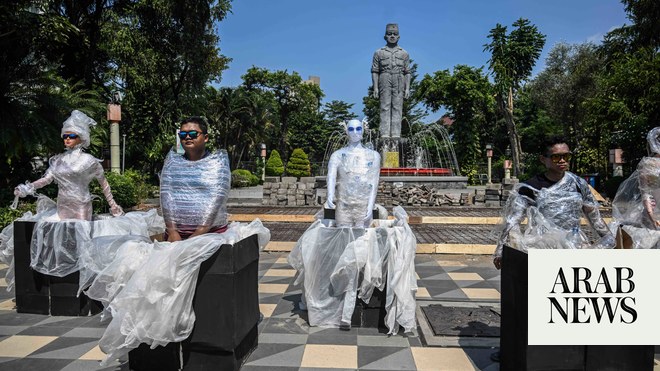
Bangladesh was the first country to ban plastic bags in 2002 but failed with enforcement
Government vows to crack down on polythene producers from November
Dhaka: Bangladesh will enforce a ban on thin plastic grocery bags starting next week — over 20 years after it passed legislation prohibiting their use.
The country became the first in the world to ban plastic bags after they were found to have choked its drainage systems during devastating floods in 2002.
It introduced heavy fines and prison sentences for producing, using and marketing polythene — the plastic from which most single-use bags are made — but the initially successful initiative eventually failed to sustain, mainly due to weak enforcement.
Bangladesh’s new interim government announced earlier this month that it would take legal action against supermarkets from Oct. 1 and all other markets from Nov. 1 for failing to follow the 2002 ban.
Syeda Rizwana Hasan, adviser to the government and de facto minister of environment, said during a meeting with the Dhaka city administration that “the use of polythene — a curse to the environment, climate and bio-diversity — must be stopped at any cost” and that from Nov. 1, the government will launch operations against polythene producers.
“Everyone is being given ample time to adapt, and we are also working on providing alternatives.”
The implementation of the 2002 ban was not successful earlier in part because cheap alternatives to polythene were not widely available. But since then, Bangladesh has significantly developed its jute industry, which is expected to be a main contributor of eco-friendly packaging.
“Jute bags are an easy and sustainable substitute for plastic bags,” Alamgir Kabir, secretary general of the Bangladesh Poribesh Andolon, or Bangladesh Environment Movement, told Arab News.
“We welcome the government’s initiative of banning single-use plastic bags in supermarket shops as it’s a good decision for the sake of public health. We want to see that this decision is being implemented fully.”
While the cheapest jute bag costs around 5 US cents in Bangladesh — or about as much as a banana or a cup of tea — it will initially be some burden for the poorer, but Kabir argued it was high time that Bangladesh took action against single-use plastics.
“If we consider the case of Dhaka city, our drainage system is completely disrupted by these polythene bags. These bags ultimately flow into the rivers causing a serious problem with navigability. They are a serious threat to our public health as plastic particles are found inside fishes, and this is how plastic enters into our food cycle,” he said.
“Authorities banned the use of plastic bags around two decades ago. But due to a lack of political and administrative will, this decision couldn’t be implemented, resulting in a flood of polythene bags across the country.”












